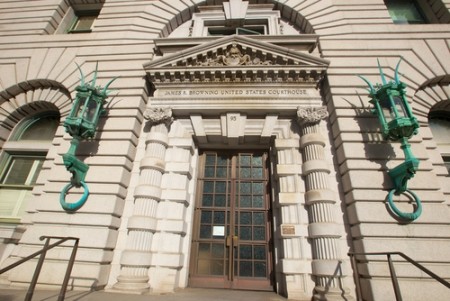9th Circuit orders government to stop detaining immigrant minors without court hearings

The San Francisco-based 9th U.S. Circuit Court of Appeals.
A unanimous panel of the San Francisco-based 9th U.S. Circuit Court of Appeals ruled Wednesday that minors may not be held in immigration detention without a hearing on whether they can be released, the Los Angeles Times reported.
In Flores v. Sessions (PDF), a three-judge panel was asked to decide whether two later federal laws supersede a section of a 1997 settlement governing the treatment of unaccompanied minor immigrants. The settlement—which came from an earlier incarnation of the Flores case—said in relevant part that a “minor in deportation proceedings shall be afforded a bond redetermination hearing before an immigration judge.” This is the hearing in immigration court that determines whether the government may hold someone pending a hearing on their right to stay in the United States.
After a new wave of unaccompanied minor immigrants reached the United States around 2014, attorneys for the plaintiffs in Flores moved to enforce the settlement, arguing that the federal government was in violation of the bond hearing requirement. The federal government argued that the section was terminated by the 2002 Homeland Security Act and the 2008 Trafficking Victims Protection Reauthorization Act, both of which address the government’s obligations to minors in immigration detention. U.S. District Judge Dolly Gee in Los Angeles disagreed, and the federal government appealed.
Judge Stephen Reinhardt, writing for a unanimous panel, affirmed Gee’s ruling. Neither statute explicitly mentions the agreement, he said, and neither deprives immigration courts of jurisdiction over the minors. Indeed, he wrote, giving unaccompanied minors bond hearings is consistent with the intent of both laws, which is to protect them. And bond hearings give the minors benefits that they wouldn’t have otherwise, he said, including an independent arbiter, representation by counsel (when available) and an opportunity to examine the reasons for their detention.
“Not a single word in either statute indicates that Congress intended to supersede, terminate, or take away any right enjoyed by unaccompanied minors at the time of the acts’ passage,” Reinhardt wrote. “Thus, we hold that the statutes have not terminated the Flores settlement’s bond-hearing requirement for unaccompanied minors.”
The decision comes on the heels of a Los Angeles district court decision June 27 that found the government in violation of a different part of the Flores settlement. Gee found that some unaccompanied minor immigrants were being held in facilities that didn’t meet the standards laid out in the agreement, and that some some minors are being held for longer than the 20-day time period the settlement allows. Gee appointed a juvenile coordinator to oversee compliance—something the settlement expressly called for. Gee said it was unclear whether there was ever such a monitor during the settlement’s 20-year history.
The Flores settlement grows out of a 1980s-era wave of minor immigrants from Central America. As civil rights attorney Carlos Holguín told the ABA Journal in 2016, there were no standards for the detention of minors at the time; he visited one facility where minors mixed with adults of both genders without apparent concern for safety. Flores v. Meese, as it was originally called, was in court and settlement talks for 12 years before the settlement was reached, and has been a important tool for advocates seeking to enforce immigrant minors’ rights.



